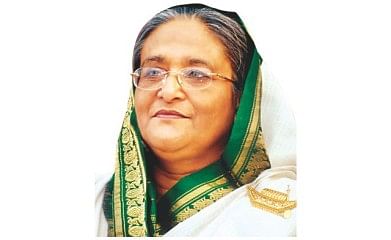Making sense of PM's interview with BBC
 PRIME Minister Sheikh Hasina in her latest interview with BBC Bangladesh correspondent, Ambarasan Ethirajan, came into her elements like she did in Stephen Sackur's HardTALK encounter on July 30, 2012. She refuses to be cornered by any question, however provocative and unsavoury it may be; she keeps her composure -- unruffled. She has an uncanny way of breaking free from any shoehorn situation that experienced interviewers are likely to put her into, given the controversies she has created around her leadership profile.
PRIME Minister Sheikh Hasina in her latest interview with BBC Bangladesh correspondent, Ambarasan Ethirajan, came into her elements like she did in Stephen Sackur's HardTALK encounter on July 30, 2012. She refuses to be cornered by any question, however provocative and unsavoury it may be; she keeps her composure -- unruffled. She has an uncanny way of breaking free from any shoehorn situation that experienced interviewers are likely to put her into, given the controversies she has created around her leadership profile.
Like a leopard never changing stripes, the ruling party and the opposition have been locked in do-or-die battles in the last year of an incumbent government as a matter of rule. The people and the economy are cracked under a sledgehammer, as it were. Of course, the seeds of distrust and suspicion, sown in the preceding four years, only reap a monstrous whirlwind at the end of the day.
In the words of Rebecca West, a left-wing journalist in UK: "There is no such thing as a conversation. There are intersecting monologues, that's all."
You get an echo of Rebecca's wisecrack in the question-answer session over the BBC World Service's interview with the prime minister. Ambarasan Ethirajan did not hesitate to put tough, probing questions to the PM, a line he steadfastly maintained, tinged with politeness, to get answers to some core questions agitating the minds of the people. So also the prime minister kept making her points insistently with the conversation turning into "intersecting monologues."
The government's ruthless law and order approach can breed a false sense of invincibility as the objective situation strays into dangerous territory.
The PM has termed hartal as a commonplace occurrence (mamuli). But can successive hartals be made light of, given their paralytic effects on national life? Curiously, she said that her government did not interfere with hartal which she thought was a democratic right of any political party. At the same time, her government adopts obstructionist policy including imprisoning senior opposition leaders on grounds not befitting their known reputation. Making it difficult for a major political party to function with its hierarchy mostly in jail is clearly taking the standoff to a point where avenues for discussion are shut off. Giving the BNP the taste of its own medicine, that too in overdose, smacks of blood feud as though in a tribal culture.
Granted, the AL government had firmly dealt with extremism and terrorism between 2001 and 2006, but now the country faces radicalism of a different type, of which we have had no previous experience. This raises the spectre of attempted Talibanisation, or a variant of it. How could we be treated to a set of demands that threatened to push life into medieval age? The PM's ruling out of blasphemy act finds a responsive chord in the BNP, which is laudable. The Islamist movement ballooned around a single issue of hurting religious sentiments of the people by a handful of bloggers.
The arrest of some bloggers has been accompanied by placing the social media network under the microscope. Even free and responsible thinking might be a casualty of moral disciplining, stretched to any inelastic point. Besides, instances of making intrusive entries into the blogs of others are before us. A case in point is planting hurtful message into Uttam's Facebook that caused a destructive communal maelstrom in Ramu.
The massive gathering of Islamic parties came as a reaction to Jagaron Moncho; the battle lines were clearly drawn pitting modernist secular temper and liberation war ethos against 'Islam in danger' bogey bandied about by obscurantist elements.
Much is being made about "atheism" but as Erica Jong, a poet and fiction writer, quipped: "There is no atheist on turbulent airplanes."
At any rate, if Hefajat-e-Islam takes on the character of a political platform it may lose appeal with the people that at one time had climaxed into a resounding grandstanding by the religious formation.
This is not to trifle with the Islamist resurgence but to say that ideology will have to be fought with ideology. You cannot lower your guard on the phenomenon of financing ideas and counter ideas, some from external sources.
The prime minister's assumptions of everything being hunky-dory has a fragile foundation. For instance, she presumes that opposition will take part in the general election even if it were held under the incumbent government -- indeed "egotism is an anesthetic" that dulls the sense of realism.
How does she also assume, given her staunch opposition to the caretaker system, that a situation will not arise in which the army may be drawn into playing its "constitutional role"?
Let me echo two of the suggestions voiced lately by discerning quarters about the ways to bridge the deepening cleavages in national politics. One, the progressive forces should unite to fend off regressive tendencies by dinning this message into the ears of the gullible: that our people have in their DNA a certain proclivity towards drawing a line between religion and politics or state affairs. Two, the AL and the BNP as centrist parties, one left-of-centre and the other to its right, should make a common cause of staving off ultra radicalism.
The writer is Associate Editor, The Daily Star.
E-mail: [email protected]

 For all latest news, follow The Daily Star's Google News channel.
For all latest news, follow The Daily Star's Google News channel. 



Comments